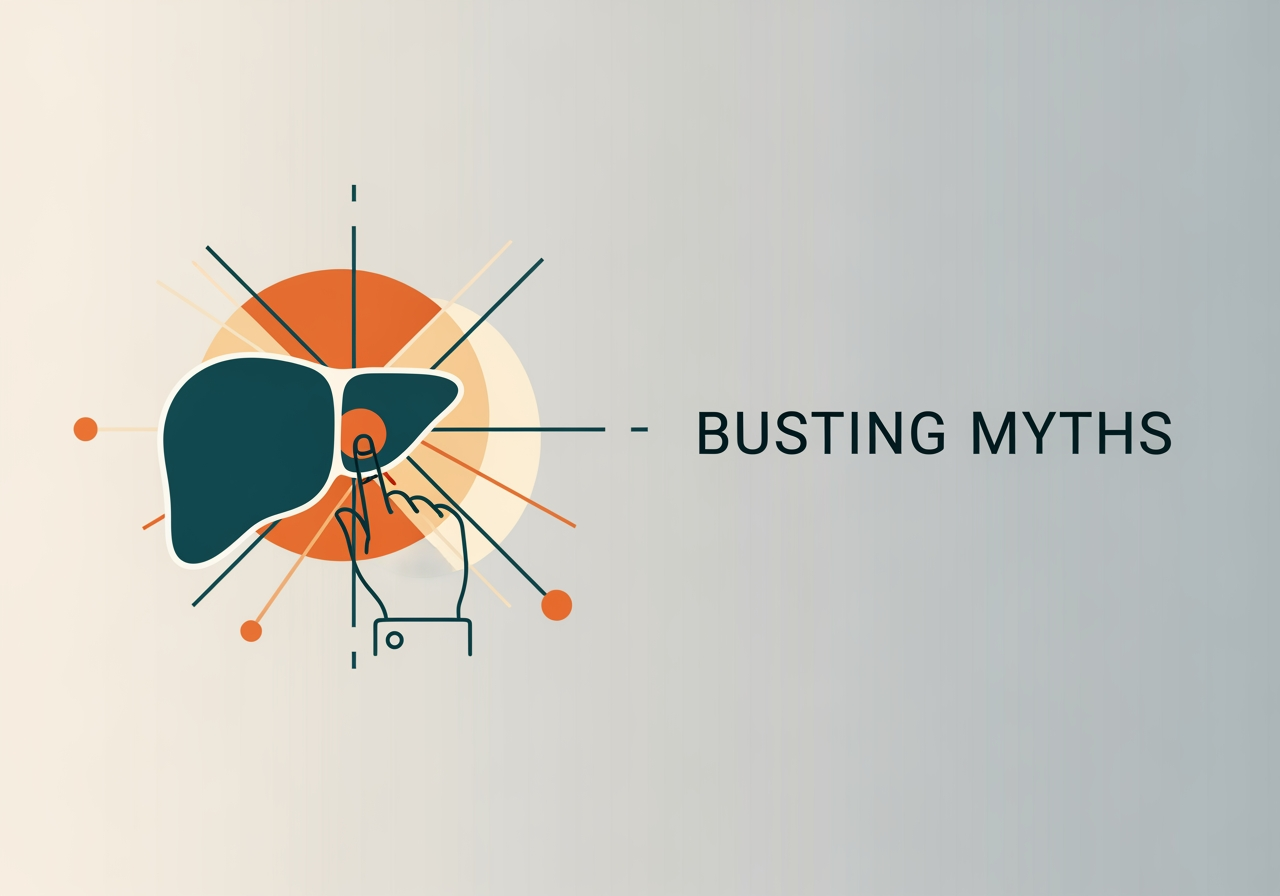
Common Myths About Liver Transplant Doctors Bust Them
15 Nov, 2025
 Healthtrip
Healthtrip- < li>Myth: Liver Transplants Are Only For Alcoholics - Doctors Clarify!
- Myth: You Need to Be Very Sick to Qualify for a Liver Transplant - Understanding MELD Scores at Fortis Memorial Research Institute, Gurgaon
- Myth: The Liver Transplant Waiting List is Hopeless - Exploring Alternatives at Vejthani Hospital
- Myth: Liver Transplants are Only for Young People - Age and Transplantation at Memorial Bahçelievler Hospital < li>Myth: Your Body Will Reject the New Liver for Sure - Immunosuppression Explained at Singapore General Hospital
- Myth: Life After a Liver Transplant is Miserable - Debunking the Myths ,Patient Stories from Yanhee International Hospital
- Conclusion: Separating Fact from Fiction in Liver Transplantation
Myth 1: Liver Transplants Are Only for Alcoholics
One of the most pervasive and harmful myths is that liver transplants are exclusively for individuals with alcohol-related liver disease. This couldn't be further from the truth! While excessive alcohol consumption can indeed lead to liver damage and cirrhosis, many other conditions can necessitate a liver transplant. These include viral hepatitis (B and C), non-alcoholic fatty liver disease (NAFLD), autoimmune diseases like primary biliary cirrhosis (PBC), genetic disorders like Wilson's disease, and even certain types of liver cancer. It’s crucial to remember that doctors at hospitals like Vejthani Hospital and Saudi German Hospital Cairo evaluate each patient based on the severity of their liver disease and their overall health, not on the cause of the damage. Attributing the need for a transplant solely to alcohol consumption is not only inaccurate but also stigmatizes patients who may be dealing with complex and often uncontrollable health issues. We are here to help you connect with reputable medical centers offering comprehensive evaluations, ensuring that everyone receives the care they deserve, irrespective of the underlying condition.
Most popular procedures in India
Myth 2: You Have to Be Young and Perfectly Healthy to Qualify
This myth often discourages older individuals or those with other health issues from even considering liver transplantation. While it's true that overall health plays a significant role in determining eligibility, age is not the sole deciding factor. Doctors at facilities like Fortis Hospital, Noida, and Memorial Bahçelievler Hospital, Istanbul, consider a patient's overall physiological age and their ability to withstand the surgery and post-transplant recovery. Many successful liver transplants have been performed on patients in their 60s and 70s who are otherwise in reasonably good health. Similarly, having other medical conditions, such as well-managed diabetes or hypertension, doesn't automatically disqualify you. The transplant team will conduct a thorough evaluation to assess the risks and benefits, ensuring that the transplant is a viable option. The goal is to improve the patient's quality of life and extend their lifespan, and this assessment is tailored to each individual's unique circumstances. Healthtrip is there to guide you through this evaluation process, connecting you with specialists who can offer personalized advice and support.
Myth 3: The Waiting List Is Too Long; You'll Never Get a Liver in Time
The waiting list for a liver transplant can be daunting, and it's understandable to feel discouraged by the perceived length of the wait. However, the reality is more nuanced than a simple waiting game. The allocation of donor livers is based on a complex system that prioritizes patients with the most urgent medical needs, often referred to as the Model for End-Stage Liver Disease (MELD) score. Patients with higher MELD scores, indicating more severe liver disease, are given higher priority. While the wait time can vary depending on your blood type, MELD score, and geographic location, it's not necessarily a predictor of whether you'll receive a transplant in time. Moreover, living donor liver transplantation, where a portion of a healthy person's liver is transplanted, is an option that can significantly shorten the wait time. Hospitals like Mount Elizabeth Hospital in Singapore and Quironsalud Hospital Murcia in Spain, are at the forefront of transplant procedures. Healthtrip can help you navigate these complexities, providing information on transplant centers with shorter waiting times and exploring the possibility of living donor transplantation, giving you the best possible chance of receiving a life-saving organ.
Wellness Treatments
Give yourself the time to relax
Lowest Prices Guaranteed!

Lowest Prices Guaranteed!
Myth 4: Life After a Liver Transplant Is Miserable
This myth paints a bleak picture of life after a liver transplant, suggesting that it's filled with constant illness, debilitating side effects, and a severely restricted lifestyle. While it's true that post-transplant life requires ongoing medical management and adherence to a specific medication regimen, the reality for most patients is far from miserable. The vast majority of liver transplant recipients experience a significant improvement in their quality of life. They are able to return to work, engage in hobbies, travel, and enjoy a normal life with their loved ones. The immunosuppressant medications taken to prevent organ rejection can have side effects, but these are often manageable with careful monitoring and adjustments to the medication dosage. Furthermore, advancements in immunosuppressant drugs have led to fewer and less severe side effects. Leading experts at hospitals like NMC Royal Hospital Sharjah and London Medical provide comprehensive post-transplant care. Healthtrip is committed to connecting you with the resources and support you need to thrive after your transplant, helping you lead a fulfilling and active life.
Myth 5: The Body Will Eventually Reject the New Liver
The fear of rejection is a common concern among liver transplant recipients, fueled by the myth that the body will inevitably reject the new organ. While rejection is a possibility, it's not an inevitability. With the advancements in immunosuppressant medications and careful monitoring, the rates of acute rejection have significantly decreased. Most rejection episodes are mild and can be effectively treated with adjustments to the medication regimen. Chronic rejection, a slower and more gradual process, is less common but can still occur. Regular follow-up appointments with the transplant team at hospitals such as Singapore General Hospital and Helios Klinikum Erfurt are crucial for detecting and managing any signs of rejection. Adhering to the prescribed medication schedule and maintaining a healthy lifestyle are also essential for preventing rejection. At Healthtrip, we provide access to leading transplant centers and specialists who offer comprehensive long-term care, empowering you to proactively manage your health and minimizing the risk of rejection, allowing you to enjoy the full benefits of your new liver.
Myth: Liver Transplants Are Only For Alcoholics - Doctors Clarify!
Let’s address a misconception that has unfortunately stigmatized liver disease and transplantation for far too long: the idea that liver transplants are exclusively for individuals with alcohol-related liver damage. This couldn’t be further from the truth! While excessive alcohol consumption can certainly lead to liver cirrhosis and subsequent liver failure, it is just one of many culprits behind this devastating condition. Many other diseases and conditions can damage the liver, necessitating a transplant in severe cases. The reality is far more complex and nuanced than this harmful generalization suggests. We at Healthtrip understand that navigating the realm of medical information can be overwhelming, especially when dealing with sensitive topics like liver disease. That's why we are committed to providing accurate, accessible, and compassionate information to empower you to make informed decisions about your health. The Saudi German Hospital in Cairo, Egypt, for instance, provides comprehensive liver care, addressing a wide spectrum of liver diseases beyond just those linked to alcohol. They recognize the importance of individualized treatment plans, acknowledging the diverse range of factors that can impact liver health. From hepatitis to autoimmune disorders, the causes of liver failure are numerous and often overlooked.
Beyond Alcohol: Understanding the Spectrum of Liver Diseases
So, what are some of these other causes? Viral hepatitis, particularly hepatitis B and C, remains a significant global health concern and a leading cause of liver cirrhosis and liver cancer. Non-alcoholic fatty liver disease (NAFLD), often associated with obesity and diabetes, is on the rise worldwide, presenting a growing challenge to liver health. Autoimmune conditions like autoimmune hepatitis and primary biliary cholangitis can also wreak havoc on the liver, leading to inflammation and scarring. Genetic disorders like Wilson's disease and hemochromatosis, which cause the accumulation of copper and iron, respectively, can also severely damage the liver. These are just a few of the many conditions that can lead to liver failure and the need for a transplant. It's crucial to understand that lifestyle choices alone do not define a person's eligibility for a liver transplant. Medical professionals at leading institutions such as the Saudi German Hospital Alexandria, Egypt, carefully evaluate each patient's unique circumstances, considering the severity of their liver disease, their overall health, and their commitment to post-transplant care. Attributing liver failure solely to alcohol consumption not only perpetuates harmful stereotypes but also overlooks the diverse range of medical conditions that can compromise liver health and potentially necessitate a life-saving transplant.
Myth: You Need to Be Very Sick to Qualify for a Liver Transplant - Understanding MELD Scores at Fortis Memorial Research Institute, Gurgaon
Another common misconception surrounding liver transplantation is the belief that you need to be on death's doorstep to even be considered for the procedure. While it is true that liver transplants are typically reserved for individuals with advanced liver disease, the goal is to intervene before the patient becomes critically ill. Allowing the disease to progress to a very late stage can significantly reduce the chances of a successful transplant outcome. Evaluating the severity of liver disease and determining transplant eligibility involves a comprehensive assessment, and one of the key tools used by medical professionals is the Model for End-Stage Liver Disease, or MELD, score. This scoring system utilizes various blood tests, including bilirubin, creatinine, and INR (international normalized ratio), to objectively assess liver function. The MELD score helps prioritize patients on the transplant waiting list, ensuring that those with the most urgent need receive timely access to this life-saving procedure. Fortis Memorial Research Institute in Gurgaon, India, employs the MELD score system rigorously as a factor in their comprehensive transplant assessment protocols, alongside other medical criteria. Their multidisciplinary teams carefully evaluate each patient's unique circumstances to determine the optimal timing for transplantation, aiming for the best possible outcome. At Healthtrip, we guide you to the appropriate resources for understanding the MELD score so that you can be well-informed about your or your loved one's transplant journey.
The MELD Score: A Key to Prioritization and Timely Intervention
The MELD score ranges from 6 to 40, with higher scores indicating more severe liver disease. Generally, patients with a MELD score of 15 or higher are considered for liver transplantation. However, it's important to note that the MELD score is not the sole determinant of transplant eligibility. Other factors, such as the presence of complications like ascites (fluid buildup in the abdomen), encephalopathy (brain dysfunction due to liver failure), and recurrent variceal bleeding (bleeding from enlarged veins in the esophagus), are also taken into consideration. The transplant team at Fortis Shalimar Bagh, a sister facility of Fortis Memorial Research Institute, emphasizes a holistic approach, carefully weighing all relevant factors to make the most informed decision for each patient. Waiting until a patient is critically ill can lead to a greater risk of complications during and after the transplant. Therefore, the medical community strives to identify candidates for liver transplantation at an appropriate stage, maximizing the chances of a successful outcome and improving the patient's overall quality of life. Healthtrip believes in empowering patients with knowledge, and understanding the MELD score is a crucial step in navigating the complex world of liver transplantation. By collaborating with leading medical institutions like Fortis Memorial Research Institute, we can provide you with the resources and support you need to make informed decisions about your health.
Myth: The Liver Transplant Waiting List is Hopeless - Exploring Alternatives at Vejthani Hospital
The liver transplant waiting list is undoubtedly a source of anxiety and uncertainty for many patients with end-stage liver disease. The demand for donor organs far exceeds the supply, resulting in long waiting times and, unfortunately, some patients not surviving long enough to receive a transplant. However, it is essential to dispel the myth that the waiting list is entirely hopeless. While the challenges are real, there are strategies and alternatives that can improve a patient's chances of receiving a transplant and maintaining their health while waiting. One such strategy is to explore living donor liver transplantation, where a portion of a healthy individual's liver is transplanted into the recipient. This can significantly shorten waiting times and, in some cases, offer a better outcome compared to deceased donor transplantation. Medical centers like Vejthani Hospital in Thailand have established robust living donor liver transplant programs, providing patients with faster access to transplantation. Vejthani Hospital's comprehensive transplant program highlights the proactive measures that can be taken to address the donor shortage and improve patient outcomes. Healthtrip aims to connect you with leading hospitals like Vejthani Hospital, ensuring you have access to the most up-to-date information and treatment options.
Bridge to Transplant: Managing Your Health While You Wait
Furthermore, it's crucial to remember that receiving a liver transplant is not solely dependent on luck. Patients can actively improve their position on the waiting list by adhering to medical recommendations, managing their underlying liver disease, and maintaining a healthy lifestyle. This includes following a balanced diet, avoiding alcohol and smoking, and engaging in regular physical activity. Additionally, patients should work closely with their healthcare team to address any complications of liver disease, such as ascites, encephalopathy, and variceal bleeding. These measures can help stabilize their condition and prevent further deterioration while awaiting transplantation. For example, Saudi German Hospital Dammam offers comprehensive support services that can improve patients overall health. Healthtrip is here to guide you in your search for the right medical professionals and resources, ensuring you are well-supported throughout the pre-transplant process. The reality is that the liver transplant waiting list presents unique challenges, but it is not insurmountable. By exploring all available options, actively managing their health, and working closely with their healthcare team, patients can significantly improve their chances of receiving a life-saving transplant. With the support of Healthtrip, you can navigate the complexities of the liver transplant journey with confidence and hope.
Also Read:
Myth : Liver Transplants are Only for Young People - Age and Transplantation at Memorial Bahçelievler Hospital
The misconception that liver transplants are exclusively for young individuals is far from the truth. Medical advancements have broadened the horizons of transplantation, making it a viable option for many older adults as well. Age, in itself, is not an absolute barrier to liver transplantation. The decision to proceed with a transplant is based on a comprehensive evaluation of the patient's overall health, physiological age, and the presence of any co-existing medical conditions. At Memorial Bahçelievler Hospital, a multidisciplinary team meticulously assesses each patient to determine their suitability for transplantation. This assessment includes a thorough review of their medical history, physical examination, and various diagnostic tests to evaluate organ function and overall health status. The key factor is the patient's ability to withstand the rigors of surgery and post-transplant immunosuppression, which is crucial for preventing organ rejection. Therefore, while younger patients might have certain advantages in terms of recovery, older adults can also benefit significantly from liver transplantation, provided they meet the necessary medical criteria and have a reasonable life expectancy. Memorial Bahçelievler Hospital emphasizes personalized care, tailoring treatment plans to meet the unique needs of each patient, regardless of their age. The hospital’s experienced transplant team ensures that older recipients receive comprehensive support throughout the transplant process, from pre-operative evaluation to post-operative care, thereby maximizing their chances of a successful outcome and improved quality of life.
Myth: Your Body Will Reject the New Liver for Sure - Immunosuppression Explained at Singapore General Hospital
The fear of organ rejection is a common concern among individuals considering liver transplantation. While it is true that the body's immune system naturally recognizes the transplanted liver as foreign and may attempt to reject it, the advancements in immunosuppressive therapy have significantly reduced the risk of rejection. Immunosuppressants are medications that suppress or weaken the immune system, preventing it from attacking the new liver. At Singapore General Hospital, the transplant team utilizes a sophisticated approach to immunosuppression, employing a combination of medications tailored to each patient's individual needs. These medications are carefully monitored and adjusted tostrike a balance between preventing rejection and minimizing side effects. Singapore General Hospital emphasizes the importance of patient education, ensuring that recipients understand the critical role of adherence to their immunosuppression regimen. Patients receive comprehensive instructions on medication administration, potential side effects, and the importance of regular follow-up appointments for monitoring their immune response and overall health. While rejection can still occur despite immunosuppression, it is often manageable with prompt intervention. Singapore General Hospital has established protocols for detecting and treating rejection episodes, including adjusting immunosuppressant dosages or using alternative therapies. The hospital's expertise in immunology and transplantation ensures that patients receive the best possible care to minimize the risk of rejection and maximize the long-term success of their liver transplant. With diligent monitoring and patient compliance, the myth of certain rejection can be effectively debunked.
Myth: Life After a Liver Transplant is Miserable - Debunking the Myths ,Patient Stories from Yanhee International Hospital
The notion that life after a liver transplant is inherently miserable is a gross exaggeration. While the recovery period may present its challenges, the vast majority of transplant recipients experience a significant improvement in their quality of life. Life after transplantation often involves a newfound sense of vitality, freedom from the debilitating symptoms of liver disease, and the ability to engage in activities that were previously impossible. Yanhee International Hospital understands that the journey doesn't end with the surgery; it's about reclaiming a full and meaningful life. The hospital’s comprehensive post-transplant care program focuses on empowering patients to optimize their health and well-being. This includes personalized rehabilitation plans, nutritional counseling, and psychological support to address the physical, emotional, and social aspects of recovery. Yanhee International Hospital also emphasizes the importance of patient support groups, where recipients can connect with others who have undergone similar experiences, share their stories, and find encouragement. Patient testimonials often paint a vivid picture of renewed health, energy, and the ability to pursue long-held dreams. While life after transplant requires ongoing medical care and adherence to immunosuppressant medications, it is far from miserable. It is a testament to the resilience of the human spirit and the transformative power of transplantation. Yanhee International Hospital is committed to supporting patients every step of the way, helping them to live fulfilling and productive lives after their liver transplant.
Also Read:
Conclusion: Separating Fact from Fiction in Liver Transplantation
Liver transplantation is a complex and life-saving procedure that is often shrouded in misconceptions. By debunking these myths, we aim to provide accurate information and dispel unwarranted fears, empowering individuals to make informed decisions about their health. From understanding that liver transplants aren't exclusively for alcoholics to recognizing that age isn't necessarily a barrier, it's crucial to understand the realities of transplantation. Similarly, advancements in immunosuppression have significantly reduced the risk of organ rejection, and life after transplant is often marked by a significant improvement in quality of life. Healthtrip is dedicated to providing patients with access to world-class medical care and accurate information about liver transplantation. We work with leading hospitals and transplant centers around the globe, such as Fortis Memorial Research Institute, Gurgaon (https://www.healthtrip.com/hospital/fortis-memorial-research-institute), Vejthani Hospital (https://www.healthtrip.com/hospital/vejthani-hospital), Memorial Bahçelievler Hospital (https://www.healthtrip.com/hospital/memorial-bahcelievler-hospital), Singapore General Hospital (https://www.healthtrip.com/hospital/singapore-general-hospital) and Yanhee International Hospital (https://www.healthtrip.com/hospital/yanhee-international-hospital) ensuring that patients receive comprehensive support throughout their transplant journey. Our goal is to connect patients with the best possible medical expertise and resources, enabling them to overcome liver disease and live healthier, more fulfilling lives. Healthtrip offers personalized assistance with every step of the process, from initial consultations and travel arrangements to post-operative care in renowned facilities. By separating fact from fiction, we hope to inspire hope and empower individuals to explore liver transplantation as a viable option for improving their health and well-being.
Related Blogs

Patient Satisfaction Scores for Plastic Surgery at Healthtrip Partner Hospitals
Explore evaluations, innovations, hospital comparisons, and global success insights for

How to Choose the Right Hospital for Plastic Surgery Using Healthtrip's Criteria
Explore evaluations, innovations, hospital comparisons, and global success insights for

Latest Global Innovations in Plastic Surgery Now Available in India
Explore evaluations, innovations, hospital comparisons, and global success insights for

How Healthtrip Ensures Evidence-Based Care in Plastic Surgery
Explore evaluations, innovations, hospital comparisons, and global success insights for

Success Rates of Plastic Surgery in India Compared to Other Countries
Explore evaluations, innovations, hospital comparisons, and global success insights for

Complete Medical Evaluation Process Before Plastic Surgery
Explore evaluations, innovations, hospital comparisons, and global success insights for










